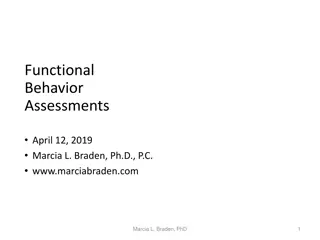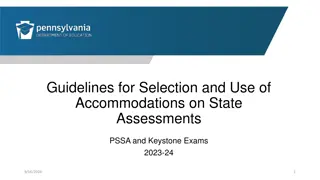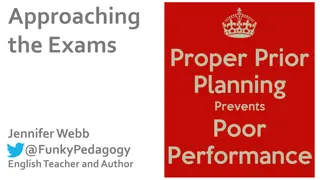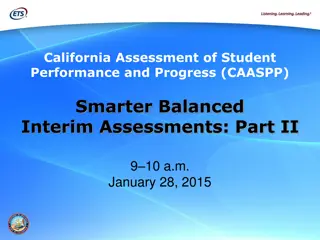Supporting Students for Assessments and Exams
Ensure your child is well-prepared for assessments and exams by providing a conducive workspace, managing their time effectively, helping them stay organized, and promoting a healthy study routine. Encourage regular attendance, open communication, and constructive support to alleviate stress and enhance academic performance.
Download Presentation

Please find below an Image/Link to download the presentation.
The content on the website is provided AS IS for your information and personal use only. It may not be sold, licensed, or shared on other websites without obtaining consent from the author.If you encounter any issues during the download, it is possible that the publisher has removed the file from their server.
You are allowed to download the files provided on this website for personal or commercial use, subject to the condition that they are used lawfully. All files are the property of their respective owners.
The content on the website is provided AS IS for your information and personal use only. It may not be sold, licensed, or shared on other websites without obtaining consent from the author.
E N D
Presentation Transcript
Study Advice for Parents and Carers November 2020
Preparing for Assessments It is important that young people are supported at home to prepare them well for internal assessments and external exams. The type of support required may depend upon the course assessment. Assessment types will vary but may include : assignments, practical activity, performance, portfolio of work, project, research task, multiple choice test, question paper in class, question paper under exam conditions. Regular attendance throughout the year will help to ensure that your child keeps up with course work and homework. Talking to your child to reassure and encourage them, and taking an appropriate level of interest in what they are doing, will help them get through what can be a stressful time and will help them to do their best.
Creating a workspace Try to create a workspace for your child that: is quiet and free from interruptions and distractions, particularly younger family members has a comfortable desk and chair maintains a comfortable temperature and good light has all the resources needed nearby : paper, pencil, dictionary, etc. avoids clutter tidiness and organisation makes a difference has water and snacks available to prevent unnecessary visits to the kitchen.
Managing their time Young people often delay the start of preparation and studying for assessments, and often do not know where to start or how to organise themselves. You can help: talk to your child or look at Show My Homework to find out the dates of forthcoming assessments and deadlines encourage your child to start revising / working on an assessment in good time to avoid cramming and undue stress use the school s Study Planners to plan a realistic timetable of study for each subject(available in Pupil Zone Study Support) encourage your child to concentrate fully for 40 minute sessions with a 10-15 minute break before starting again. Older pupils may work for longer periods of time but breaks should be built in encourage your child to avoid timewasting by looking at their phone / social media. Details required Personal: name/address/date of birth Previous qualifications Courses chosen
Getting organised Talk to your child and help them to organise their materials and ensure everything is to-hand before starting any work. Create a revision folder for each subject and divide this by unit or topic of work. Folders can be paper based or electronic to suit your child s study preferences. Provide a supply of paper, coloured pens, highlighters, post-it notes, revision cards. If your child is sitting SQA exams, check the dates and keep a record of these in a highly visible place. The school will provide a schedule for exams / assessments and an individualised timetable for SQA exams in May. You can access the full exam timetable on the SQA website. Pupils can also use the SQA Personal Timetable Builder facility to create their own timetable. Courses chosen
Staying healthy Staying healthy throughout assessment and exam periods is very important. Encourage your child to get plenty of sleep. This is particularly important the night before an exam. Encourage your child to eat well provide healthy meals and snacks with lots of water to drink. On the morning of an exam encourage them to have a healthy breakfast on the day of an exam. Help your child or young person to avoid any unnecessary anxiety or panic by making sure they are in plenty of time for each exam and have everything they need e.g. pens, pencils, calculator, ruler. Encourage frequent exercise or simply a walk in the fresh air.
What you should do now? Ensure your child has a study plan in place for the assessment diets in January/ February and then again for April/May Support your child to access Study Skills documents in the Pupil Zone of the School Website and to follow the advice given Encourage your child to stick to the study plan Contact your child s Guidance Teacher if advice or help is required For more information on managing exam stress NHS Tips on surviving exams Samaritans - coping with exam stress Mind - 14 ways to beat exam stress
Study advice for Parents/Carers November 2020























